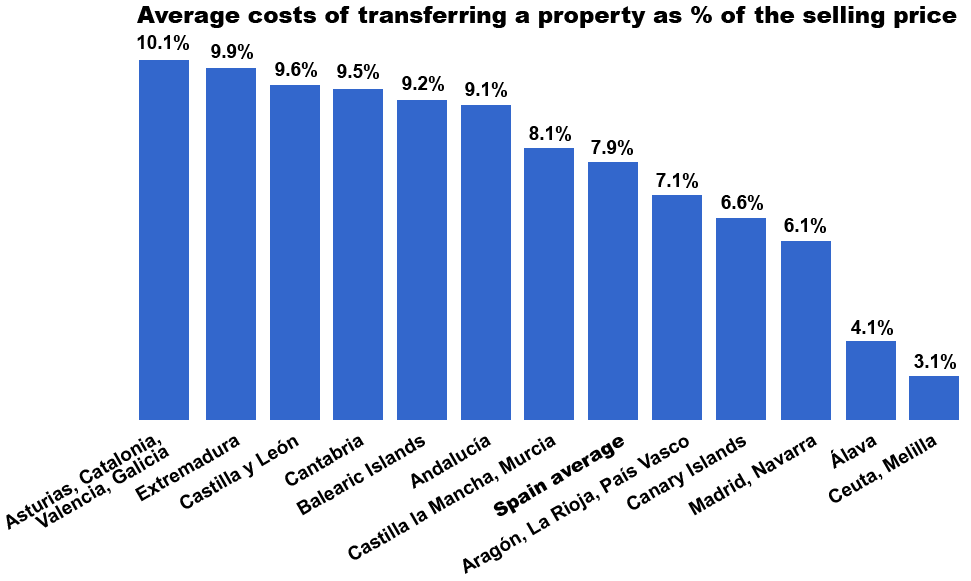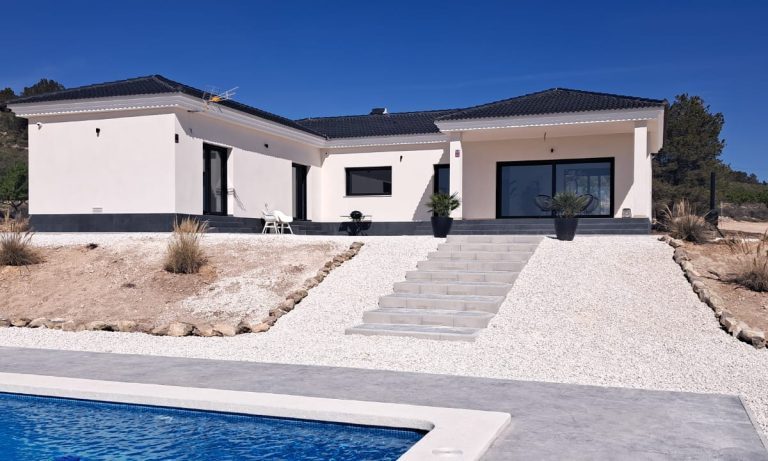We are often asked what the costs are for buying a property in Spain. When buying a Spanish property there are costs for both the buyer and the seller. However, there are uncertainties about which costs are for the buyer and which are for the seller. We will list certain questions for you.
Notary fees / Escritura: Buyer
These are the costs for drafting the deeds, the "Escritura". In general, Spanish law states that these costs must be distributed by the signatory parties, which means that the sellers have the original costs of the deeds "Escritura" and the buyer must pay for the copies. However, nowadays it is normal for the buyer to pay all these costs. The notary fees are based on the selling price stated in the deeds of the house. As an example: you pay approximately 675€ for a property of 100.000 €. But for a real estate van 1 million euro you need approx 1000 € meet the notary.
Registration costs real estate: Buyer.
It is normally a standard fee, also based on the sales price in the deeds. These costs can vary depending on the municipality in which you live and in most cases it is between 400 and 650 €.
Gestoría - Administration Office: Koper
The Gestoría is like an accountant who handles tax payments and paperwork to formalize the deed of real estate and mortgages.
Lawyers can also handle all paperwork and normally about 1% of the selling price.
Property transfer tax: Buyer
When buying a second-hand property, the buyer must pay transfer tax. For new-build real estate, the buyer pays the VAT or rather the IVA from 10%.
The transfer tax is a tax that varies from region to region
The transfer tax is in the Valencia, Catalonia and Galicia region 10%.
In the Balearic Islands it is 8% for buildings under € 400,000, 9% for buildings between € 400,000 and 600,000 and 10% for buildings of more than € 600,000.
You pay between 8% and 10% in Andalusia, and 6.5% in the Canary Islands

Cost of appraisal costs: Buyer
In the event that a buyer needs a mortgage, the bank must make a valuation of the property. In this case the buyer pays around 800/1000 € for this assessment.
New construction: Koper
When you buy a new-build home directly from the developer, you pay10% IVA (VAT) instead of paying the normal transfer tax. In addition, you also pay a tax on documented legal acts or Tax on documented legal acts (IAJD) in Spanish (Impuesto de Actos Jurídicos Documentados).
Agency Commission: Seller
When you sell a property through a broker, you have to pay a commission. Real estate agents usually charge about 6% commission in Spain. The seller can deduct the agency fee from the Agency from his joint and several income tax. As a seller you may want to request the services that the agency offers. Good brokers also need the legal know-how to make contracts, request NIE numbers and after-sales services such as changing energy bills and community costs to the new owner for example.
The seller can offer ownership to various brokers.
Sellers can advertise their home through various brokers. Nevertheless, some agents may want to offer the seller to sell them through the agreement to request a smaller commission.
Income tax provision for non-residents - Rentención: Seller
If the seller is not a resident of Spain, he must pay 3% income tax or Spanish Retención pay, which goes directly to the tax office to cover any taxes that arise from the sale. However, the seller can claim a refund if he believes that his tax is less than 3%.
Energy certificate: Seller
From June 1st, 2013 have under Spanish law all property owners who want to sell or rent their property energy certificate required. These certificates must be issued by a qualified certifier, such as architects, surveyors or technical home engineers. The costs for such a certificate can vary depending on the size of the property and may lie between 100 and 500 €. The invoice for this certificate can also be deducted from the capital gains tax.
Plusvalía:
municipal capital gains tax on the transfer of real estate Seller:
The plusvalía is a tax on the increase in the value of the land on which the property is located. This is paid to the local town hall. The plusvalía municipal is calculated based on 3 factors:
The period of ownership, the location of the property and the cadastral land value.
The plusvalía tax can be easily applied for at the town hall where the accommodation is located.
According to the law, the plusvalía municipal tax is paid by the seller and it can be a substantial sum of money. The plusvalía can nevertheless be paid by the buyer if he has agreed.


